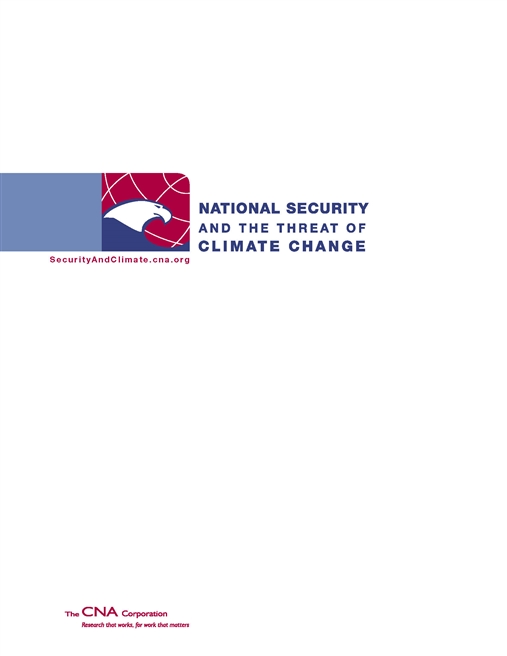The purpose of this study is to examine the national security consequences of climate change. A dozen of the nation’s most respected retired admirals and generals have served as a Military Advisory Board to study how climate change could affect our nation’s security over the next 30 to 40 years—the time frame for developing new military capabilities.
The specific questions addressed in this report are:
- What conditions are climate changes likely to produce around the world that would represent security risks to the United States?
- What are the ways in which these conditions may affect America’s national security interests?
- What actions should the nation take to address the national security consequences of climate change?
The Military Advisory Board hopes these findings will contribute to the call President Bush made in his 2007 State of the Union address to “...help us to confront the serious challenge of global climate change” by contributing a new voice and perspective to the issue.
FINDINGS
Projected climate change poses a serious threat to America’s national security. The predicted effects of climate change over the coming decades include extreme weather events, drought, flooding, sea level rise, retreating glaciers, habitat shifts, and the increased spread of life-threatening diseases. These conditions have the potential to disrupt our way of life and to force changes in the way we keep ourselves safe and secure.
In the national and international security environment, climate change threatens to add new hostile and stressing factors. On the simplest level, it has the potential to create sustained natural and humanitarian disasters on a scale far beyond those we see today. The consequences will likely foster political instability where societal demands exceed the capacity of governments to cope.
Climate change acts as a threat multiplier for instability in some of the most volatile regions of the world. Projected climate change will seriously exacerbate already marginal living standards in many Asian, African, and Middle Eastern nations, causing widespread political instability and the likelihood of failed states.
Unlike most conventional security threats that involve a single entity acting in specific ways and points in time, climate change has the potential to result in multiple chronic conditions, occurring globally within the same time frame. Economic and environmental conditions in already fragile areas will further erode as food production declines, diseases increase, clean water becomes increasingly scarce, and large populations move in search of resources. Weakened and failing governments, with an already thin margin for survival, foster the conditions for internal conflicts, extremism, and movement toward increased authoritarianism and radical ideologies.
The U.S. may be drawn more frequently into these situations, either alone or with allies, to help provide stability before conditions worsen and are exploited by extremists. The U.S. may also be called upon to undertake stability and reconstruction efforts once a conflict has begun, to avert further disaster and reconstitute a stable environment.
Projected climate change will add to tensions even in stable regions of the world. The U.S. and Europe may experience mounting pressure to accept large numbers of immigrant and refugee populations as drought increases and food production declines in Latin America and Africa. Extreme weather events and natural disasters, as the U.S. experienced with Hurricane Katrina, may lead to increased missions for a number of U.S. agencies, including state and local governments, the Department of Homeland Security, and our already stretched military, including our Guard and Reserve forces.
Climate change, national security, and energy dependence are a related set of global challenges. As President Bush noted in his 2007 State of the Union speech, dependence on foreign oil leaves us more vulnerable to hos- tile regimes and terrorists, and clean domestic energy alternatives help us confront the serious challenge of global climate change. Because the issues are linked, solutions to one affect the other. Technologies that improve energy efficiency also reduce carbon intensity and carbon emissions.
Download reportApproved for Distribution
Details
- Pages: 35
- Document Number:
- Publication Date: 4/15/2007
